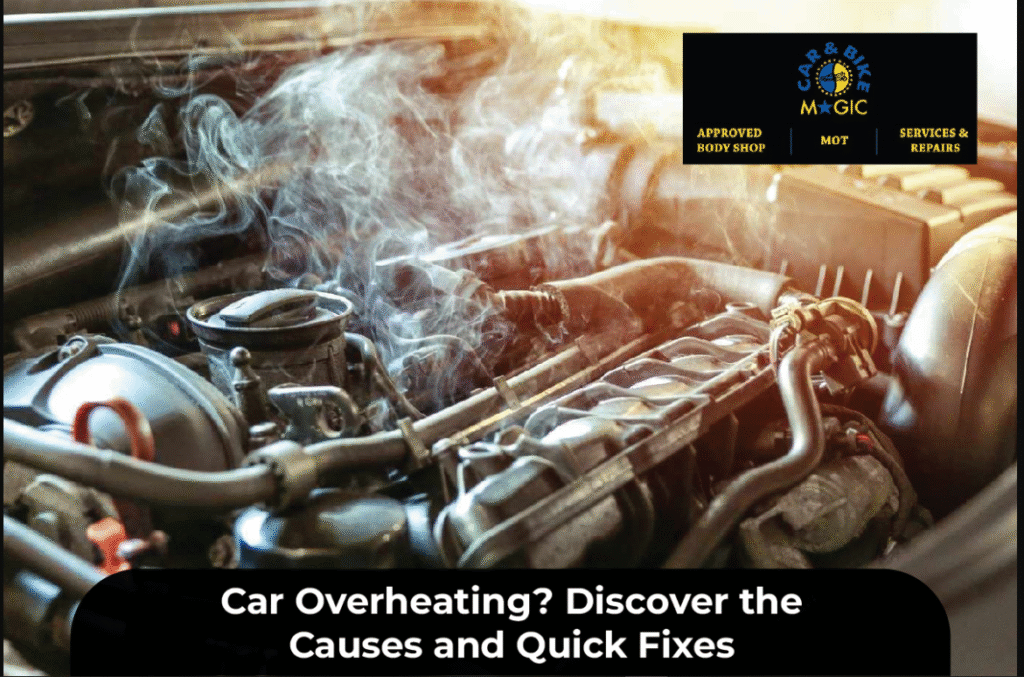There’s nothing more annoying than seeing the temperature gauge rise to red while driving along the motorway. This isn’t a problem; it’s just seasonal. It can happen anywhere and worldwide, from the cold dawns in London to hot summer afternoons in Summertime Los Angeles.
Knowing why your vehicle gets hot is essential to avoid costly repairs or unexpected breakdowns. Let’s examine the most frequently mentioned reasons and the most effective method to resolve the issue.
Low or Leaking Coolant
The coolant (or antifreeze) is the most critical component in the cooling process inside your car. If your coolant levels are low or you have a problem, the engine can’t control the temperature correctly.
Tips: Always be aware of Puddles under your vehicle and check the coolant level frequently. You must do so if you suspect a leak and need to repair it immediately.
Faulty Thermostat
The thermostat controls the flow of coolant. It can shut down and stop coolant flow if it functions poorly. This leads to extreme overheating, especially in stop-and-go traffic.
Broken Water Pump
Water pumps circulate coolant throughout your engine. If it is broken, it will not be able to circulate coolant effectively, and this causes the temperature to rise rapidly.
If you hear whining or see coolant leaks near the pump, don’t delay, as a malfunctioning pump can cause severe engine damage.
Radiator Issues
A damaged, blocked, or leaky radiator can also be a reason. A blocked radiator prevents heat from leaving the engine, which could lead to the engine becoming overheated.
Sometimes, corrosion or buildup can be the reason. Regular maintenance can help ease the issue.
Malfunctioning Cooling Fans
Cooling fans help maintain temperatures of the engine in busy times or during idle. If they stop working, your vehicle may overheat because there’s no airflow.
Damaged Hoses or Belts
Belts worn down and damaged can impede cooling fluid circulation or end it completely. The inspections and replacements that occur as part of routine maintenance can help you prevent costly repairs later.
Air Pockets in the Cooling System
Air pockets can disrupt the flow of coolant and frequently result in abrupt overheating. The cooling system must be bled often, as required, to eliminate trapped air.
Quick Fixes to Avoid Overheating
- Make sure you are watching the temperature indicator.
- Make sure to top off the coolant on a regular basis.
- Do not ignore warning signs.
- Shut off the A/C and then turn on the heater in case it is overheated (it assists in drawing warmth away from your engine).
- Make sure to stop in a safe manner if you notice your engine has overheated and driving can result in irreparable damage.
Helpful Resources for Car Care
- Paintless Dent Removal Services in Sunderland
- Car & Bike Magic Home
- Car Dent Repair: DIY vs Professional
If it’s engine problems, regular checks and repairs by a professional ensure that your vehicle is operating and new.
Final Thoughts
Overheating isn’t just a nuisance—it’s also dangerous and may seriously damage the engine. By knowing the potential reasons and taking action quickly to prevent it, you will be able to protect your car and your pocketbook.
If you are unsure, talk to an experienced mechanic who can diagnose and address the issue properly. Remember, staying on top of routine maintenance helps to avoid most of these issues prior to their getting worse.
FAQs
Q1: Can I use my vehicle in the event that it’s too hot?
No! Continue driving, and you risk an engine breakdown that could be catastrophic. Always stop safely and shut off your engine as soon as you can.
Q2: What does it cost to repair an overheated car in either the UK or the US?
It can vary based on the reason; it can range from PS100/$120 for the replacement of a thermostat to 1,200 dollars for major repairs, such as the replacement of a radiator or water pump.
Q3: How can I tell whether my radiator is blocked?
Signs of overheating include frequent leaks in coolant as well as low heater performance. A mechanic could run a pressure test to verify.
Q4: Can I make use of fluids instead of cooling in the event of an emergency?
In the event of an emergency, you may use water temporarily; however, it won’t shield you from the effects of corrosion or boiling. Replace it with a proper coolant as quickly as you can.
Q5: When do I need to change my coolant?
Most manufacturers recommend a trip each year between 30,000 and 50,000 miles, but you should consult your vehicle’s owner’s manual.

